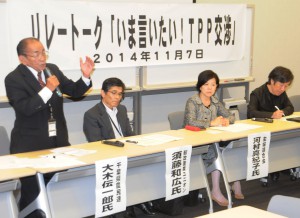Chikuma Kume
Before the ministerial meeting of the Trans-Pacific Partnership free-trade talks (TPP) being held Saturday, Nov. 8 in Beijing, China, citizen groups opposing or concerned about the TPP negotiations gathered Friday, Nov. 7 at the Members’ Office Building of the House of Councilors of Japan in Nagata-cho, Tokyo, and had “a relay talk” and a study session to gain attention for the critical situations. Those attended discussed effects on food, life, or employment if by any chance the negotiation comes to an agreement although there are no specific contents. They raised an objection saying, “We can’t allow basic agreement by the secret negotiations.”

Expert panelists each coming from different fields, warns about the dangers of TPP, in Tokyo on Friday, Nov.7.
This event was planned based on the International Action Day to be held Saturday, Nov. 8 by the citizen groups in the United States, Australia and New Zealand. About 100 people gathered at the relay talk on TPP, which was planned by a group of university teachers claiming an immediate withdrawal from the TPP negotiations, a network of lawyers against TPP, and the Housewives’ Association (Shufuren). About 30 citizens gathered at the study session held by a group on the Internet called “What Is TPP?” that is concerned about the direction of the negotiations.
In the relay talk, 8 representatives from groups of health insurance doctors, farmers, builders, university teachers and consumers made a presentation on the problems of TPP. At the start of the presentation, the national youth organization under the Japan Agricultural Cooperatives said, “We’ve had a strong sense of crisis against TPP. Young farmers will do their best for the reform of the Japan Agricultural Cooperatives and regional recreation as leaders of Japanese agriculture and regional communities. The government should face the negotiations with a strong will not to hesitate even a withdrawal.”
Denichiro Oki, president of the Chiba Prefectural Association of the Japan Family Farmers’ Movement (Nouminren) insisted “The biggest problem is the sharp decline in rice prices this year.” He pointed out that rice became the point of dispute again in the U.S.-Japan Conference in last October, and expressed his concern saying “The situation is extremely critical.”
Makiko Kawamura, standing committee member of the Shufuren, said, “It is said that there has been no progress (in the negotiations), but when we look at the recent government, it is obvious that they’re still trying to compromise by the end of this year,” and expressed her dissatisfaction saying, “We have no way of knowing what kind of negotiations are going on or to what extent they have presented concession plans in the secret negotiations. It is a big problem that we can’t see the content of the negotiations.”
On the other hand, in the study session on TPP held by citizens, participants had an open discussion on the theme of sovereignty, labor and food. They also discussed how we should transmit information based on accumulated knowledge since inauguration of the group in Aug. 2011.
(Nov. 8, 2014)

